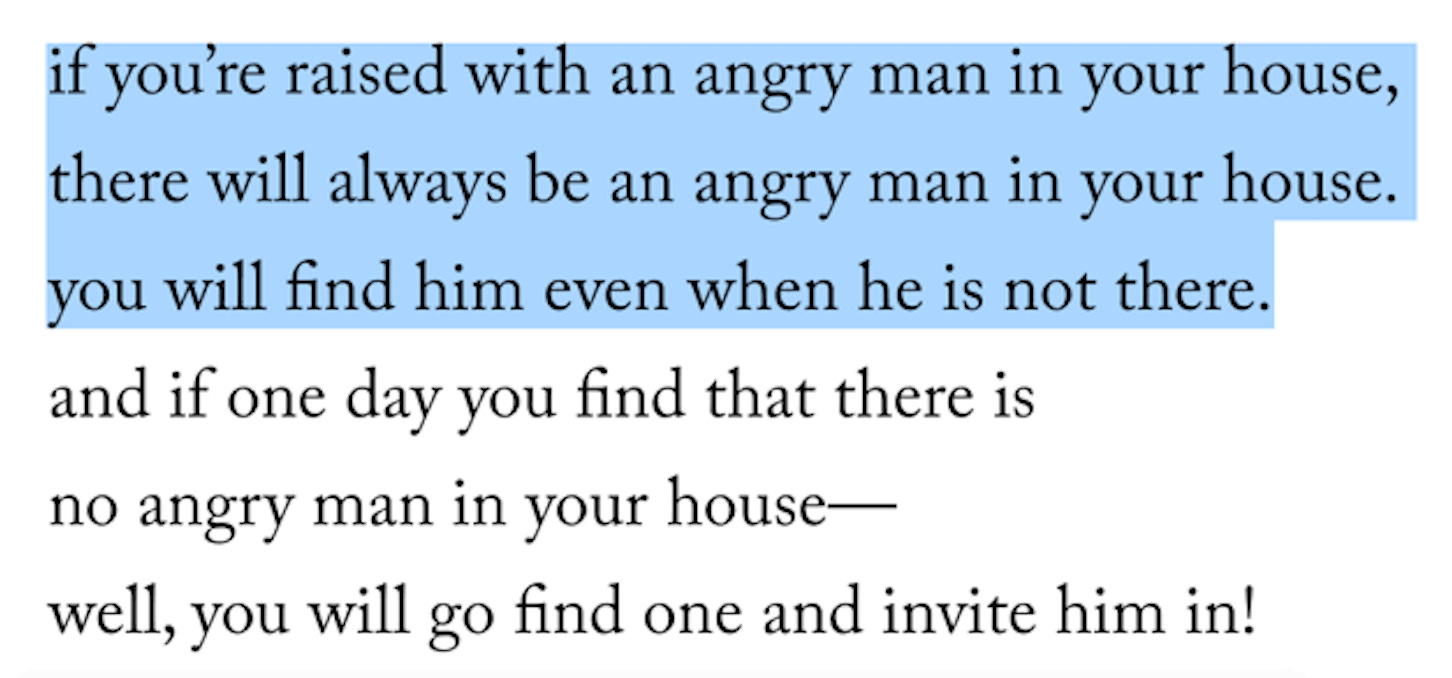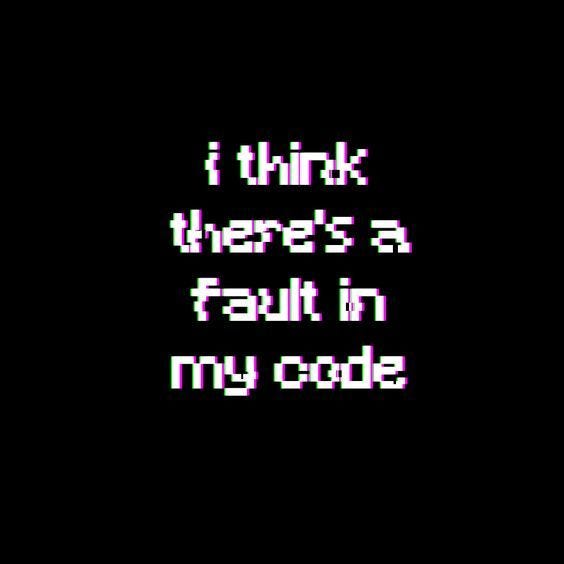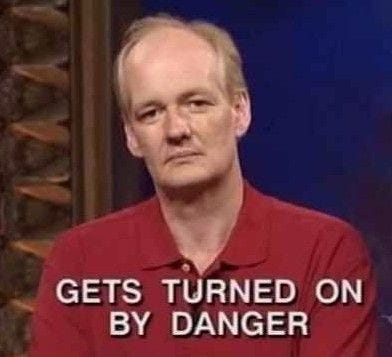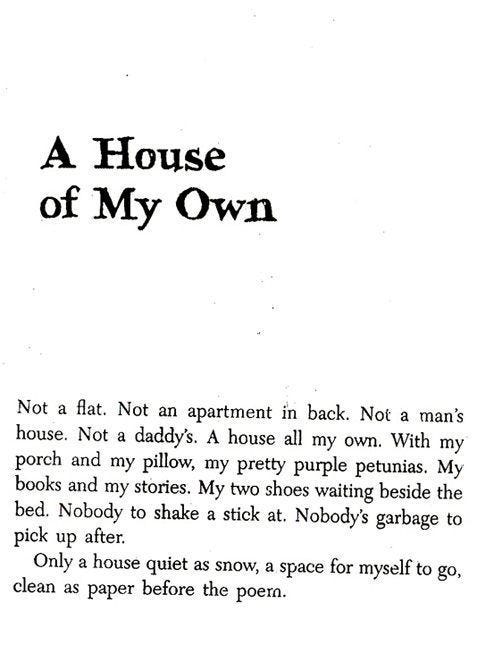toxic shame, soul murder, and scapegoats
unraveling yourself from the clutches of dysfunctional family systems and emotional neglect
This quote from Catherine Lacey’s 2019 piece in the New Yorker (“Cut”) is seared into my mind.
I, too, grew up with an angry man in my house.
I, too, found various replacements for this angry man in repetitive and toxic trauma-bonded “relationships” throughout my life because I never saw healthy love and intimacy modeled for me as a child.
What’s worse is that even now, as I find myself in a marriage with a securely attached human, that angry man still lives on within me in the form of my internalized critical inner parent.
Those of us who grew up in dysfunctional family systems where we were emotionally neglected, verbally abused, and scapegoated are all too used to hearing things like:
“The past is in the past.”
“They’re your PARENTS. Blood is thicker than water.”
“They did the best with the resources they had at the time.”
“When will you allow yourself to move forward?”
“Living with all this anger and resentment can’t be healthy for you. Can’t you just let it go?”
I would fucking love to let it go.
The problem is that my body and psyche still feel the impact of my dysfunctional upbringing and the consequences of emotionally neglectful parenting every single day of my life.
To be able to build any kind of meaningful relationship with my parents would require them to display some genuine self-reflection and acknowledgment of the impact their decisions as caregivers had on me. Instead, I am expected to bury my head in the sand, ignore the elephants in the room, and pretend like nothing is wrong.
I’ve decided I’m not willing to play that game anymore.
“Growing up, you had nothing to work with.”
My family looked good enough on paper.
Middle class. Always had a roof over my head. Never had to worry where my next meal was coming from. My basic survival needs for food/clothing/shelter were always met.
The same can’t be said for my emotional and psychological needs.
In a recent video by social worker and content creator Patrick Teahan, he shared something his mentor said to him when he was in the early phases of his recovery from his emotionally abusive and neglectful childhood:
“Growing up, you had nothing to work with.”
Patrick mentioned how profoundly this simple statement impacted and validated him and his experience. Hearing it had a similar impact on me.
He went on to discuss the importance of having self-compassion for ourselves while holding abusive and neglectful family members accountable for the impact their behavior and inability to meet our emotional needs as children had on our ability to navigate our world and relationships as adults.
As emotionally neglected children, we were set up. Set up to not know how to handle intimacy. Set up to not know how to hold extreme emotions like grief and anger. Set up to not know how to set boundaries with ourselves or others. Set up to not know how to handle toxic shame and self-blame.
Set up. And left to navigate it all alone.
We had nothing to work with.
We grew up in an impossible situation without the tools or ability to advocate for ourselves.
Some parents only see their children in the roles they put them in.
A while back, Patrick made a post on Instagram that resonated deeply with me. It read:
“When we grow up in abuse, toxic parents only see their children in the roles they put them in, not the individual and beautiful spirits right in front of them.
Part of childhood trauma is that their version of us usually becomes our identity. It’s how WE feel about ourselves.
We have to return their twisted view of us to them. As children and teens, they were the experts on who we were and had all the power.
How messed up is that?
To begin getting out of that identity is to ask:
Did your parents even know you?
Did they see you struggle, or that you were selfish about *their* struggle?
Did they know what you needed, or did they criticize you for *having* needs?
Did they know you’re funny?
Did they know why you were shy?
Did they know you were a good kid, or did you sense they felt like you were a *bad* kid?
Did they know how you felt about your friends?
Did they enjoy you?
My parents still don’t *really* know me and don’t have the capacity to.
It was scary getting rid of who they said I was because there was grief in knowing they were wrong and I had been lied to this whole time.
New rule: toxic people don’t get to tell you who you are.”
I don’t necessarily believe in labeling people as “toxic.” If you follow my work and listen to the podcast, you’ll know that I believe everyone is capable of growth and change. This includes my parents - and yours, too.
BUT.
What I’ve realized is that some people are just comfortable as hell in their dysfunction. I know this because I used to be comfortable in mine, too.
I’ve realized that just because two people decided to bring you into the world doesn’t mean you have to continue playing the role you were forced to play growing up.
You don’t have to play the game to keep yourself safe anymore. You don’t have to settle for scraps. You don’t have to accept an empty and unfulfilling relationship with anyone, not even with your parents.
You deserve to have your anger. You deserve to have needs.
YOU DESERVE TO BE TRULY KNOWN AND SEEN BY THE PEOPLE WHO BROUGHT YOU INTO THIS WORLD.
You are not crazy for wanting this. You are not crazy for feeling like something was wrong. If you feel like it was, it likely was.
The “anti-love” family.
It’s clear that Patrick has truly lived what he guides his clients and listeners through, and he uses his creative knack for storytelling and metaphor to give language to often impossible-to-explain experiences and feelings.
In another video, Patrick talks about what he calls “the anti-love family.”
The anti-love family lacks the affection, warmth, and camaraderie that exists as a given in healthy family systems.
He states, “this family dynamic is often sadly and horrifically rooted in contempt and disgust.” He mentions that in these types of families, lifetimes of self-hate within the parental figures are unconsciously projected onto their children and that these parents are “narcissistically removed from that concept.”
This is a betrayal.
He goes on to say, “There’s a sick message in a family like this: ‘If I’m miserable, you’re going to be miserable, too.”
Children growing up in environments like this either become cold and distant themselves, or their innate sensitivity becomes painfully exacerbated. Later in life, these same children grow up to expect similar treatment from adults, friends, partners, and bosses.
Kindness confuses us. We struggle to take in being lovable.
Patrick describes that parents in these “anti-love” family systems often feel “off,” which I find to be an apt description of my experience growing up. So much just felt… off.
However, as a child, I lacked the emotional maturity and perspective to know or name the dysfunction, so I floundered. I acted out. I tried to fight against the system. In the end, I decided there must be something fundamentally wrong with me.
This is how toxic shame is born.
Toxic shame and soul murder.
John Bradshaw is one of the earliest old-school founders of the self-help and recovery movement. He was talking about toxic shame long before the likes of Brené Brown.
Here’s one of my favorite passages from John where he describes finally understanding the impact toxic shame had on his life:
“I named the core demon in my life: shame.
Naming shame means that I became aware of the massive destructive power that shame had exerted in my life.
I discovered that I had been bound by shame all my life. It ruled me like an addiction.
I acted it out; I covered it up in subtle and not-so-subtle ways; I transferred it to my family, my clients, and the people I taught.
Shame was the unconscious demon I had never acknowledged.
In becoming aware of the dynamics of shame, I came to see that shame is one of the major destructive forces in all human life. In naming shame, I began to have power over it.
In itself, shame is not bad. Shame is a normal human emotion. In fact, it is necessary to have the feeling of shame if one is to be truly human. Shame is the emotion that gives us permission to *be* human.
Shame tells us of our limits. Shame keeps us in our human boundaries, letting us know we can and will make mistakes and that we need help. Healthy shame is the psychological foundation of humility.
What I discovered was that shame as a healthy human emotion can be transformed into shame as a state of being. As a state of being, shame takes over one's whole identity.
To have shame as an identity is to believe that one's being is flawed, that one is defective as a human being.
Once shame is transformed into an identity, it becomes toxic and dehumanizing.
Toxic shame is unbearable and always necessitates a cover-up, a false self.
Since one feels his true self is defective and flawed, one needs a false self that is not defective and flawed. Once one becomes a false self, one ceases to exist psychologically.
To be a false self is to cease being an authentic human being. The process of false self-formation is what Alice Miller calls "soul murder.”
As a false self, one tries to be more than human or less than human. Toxic shame is the greatest form of learned domestic violence there is. It destroys human life. Toxic shame is the core of most forms of emotional illness.
Gershen Kaufman writes:
‘Shame is the affect which is the source of many complex and disturbing inner states: depression, alienation, self-doubt, isolating loneliness, paranoid and schizoid phenomena, compulsive disorders, splitting of the self, perfectionism, a deep sense of inferiority, inadequacy or failure, the so-called borderline conditions and disorders of narcissism.’
Toxic shame so destroys the function of our authentic self that clear syndromes of shame develop out of the false self cover-ups. Each syndrome has its own characteristic pattern. Toxic shame becomes the core of neurosis, character disorders, political violence, wars, and criminality. It comes the closest to defining human bondage of all the things I know.”
Reclaiming your true self and healing from toxic shame.
I love this quote by Gloria Steinem.
Part of recovery from childhood abuse and neglect is getting real about what happened to you. It’s about picking up the metaphorical rocks of your past that you know have slimy and disgusting bugs crawling underneath them and daring to wipe what’s beneath them clean.
When you learn about concepts like childhood emotional neglect, toxic shame, the “anti-love” family, and how deeply your dysfunctional family dynamic impacted your current ability to find a life worth living and meaningful connection with others, it can fill you with a burning rage.
I know that rage all too well.
It’s okay to be angry. In fact, it’s essential to reclaim your anger and find healthy ways to express and release it. Our suppressed rage and bitterness can literally kill us if we don’t face it head-on - Dr. Gabor Maté has spoken about this at length.
I’ve come to realize that my parents have a version of me in their minds that has nothing to do with the woman I’ve become or the life I’ve built. They still don’t know me and don’t seem to care to (or have the capacity to.)
I wish I could say I’ve accepted this reality (rather than just having realized it), but I am still pretty stuck in my anger phase. I hope to move on to acceptance eventually, but I’m trying not to rush myself.
I’m giving myself permission to be in my anger right now. I never had that permission growing up, so I’m giving it back to myself. I’m allowing myself to grieve what I missed out on.
Thankfully, I find myself surrounded by healthy people in my recovery tribe who have been able to mirror back to me who I actually am. I went out fearlessly into the world and was able to find love and mirroring. But most importantly, I’m finding my true Self.
Additional resources for further exploration.
I realize this is some heavy stuff. After reading what I’ve shared, you likely have a lot of emotions coming up and want to know where the hell you’re supposed to start when it comes to unraveling the impacts of childhood emotional neglect and toxic shame.
Some resources that have been helpful for me:
Disclaimer: Listening & reading to any of the below books, lectures, and visualizations is not for the faint of heart. You *will* have some seriously difficult emotions rise to the surface. Be prepared for that. Use your discretion when attempting to do any of this work on your own. If you feel like you aren’t ready for it, there is no shame in that. If you start listening and feel overwhelmed, take a break. Take care of you. ❤️
⭒ “Running on Empty” - Jonice Webb’s book on childhood emotional neglect ($)
⭒ “The Body Never Lies: The Lingering Effects of Hurtful Parenting” by Alice Miller ($)
⭒ “Soul Murder: The Effects of Childhood Abuse and Deprivation” by Leonard Shengold ($)
⭒ “Healing the Shame that Binds You” YouTube lecture by John Bradshaw (free)
⭒ “Shame and Complex Trauma” (part 1 of 6) YouTube lecture/series by Tim Fletcher (free) [Disclaimer: There are occasional biblical references at the end of some of Tim’s videos, but you can skip these parts if they don’t resonate with you. His content is some of the most helpful sh*t I’ve come across. Take what resonates with you, and leave the rest. Don’t sleep on him because of the Christianity stuff, trust me.]
⭒ “Homecoming: Reclaiming and Championing Your Inner Child” 3+ hour YouTube lecture + meditation journey by John Bradshaw (free) [Disclaimer: John’s work is a bit dated, to be sure. So you’ll hear some language/jargon that sounds a little old school. There is gold to be found in his work, so give it a chance. Some of the visualizations and meditations in this audio lecture were some of the most healing experiences I’ve ever had.]
⭒ Guided meditation to help with anger and forgiveness by Belleruth Naparstek (free)
⭒ A Guided Meditation for Healing Complex Trauma by Belleruth Naparstek (free)
Conscious holding.
I wrote a poem yesterday when processing some of my feelings that have come up when doing some of this work around emotional neglect and toxic shame. I thought sharing it would be a good way to end this month’s newsletter.
Untethered
Many have never been truly and consciously held,
so they lack the ability to hold themselves.
For these same people, spaces like
the ocean,
deep space,
the desert sky,
inspire fear.
It’s too much emptiness to handle.
They’ve never understood what it means to feel cradled in the abyss.
Forever dangling,
forever untethered.
Belonging nowhere
to no one.
//MA
The child in me sees the child in you. Thanks for being here with me. I’ll see you right back here for next month’s Sonar System Mailer.
All my love,
Mollie
WANT MORE BFTB?
■ LISTEN TO THE BACK FROM THE BORDERLINE PODCAST
■ SIGN UP TO BECOME A PREMIUM SUBMARINE
■ LIST OF BFTB ARCHIVE EPISODES
■ THE HERO’S JOURNEY SERIES
■ LIST OF STUPID WALK EPISODES












